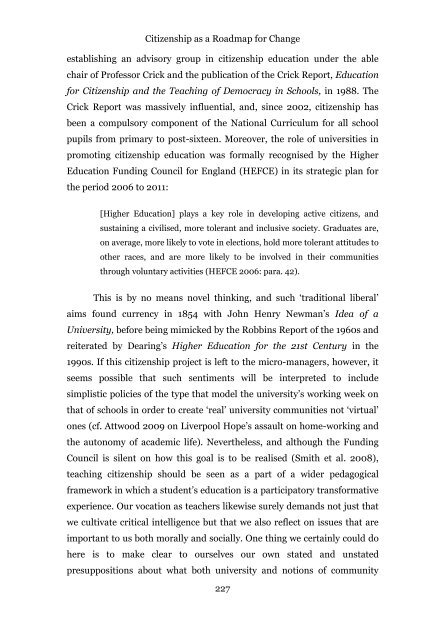The Scholarship of Engagement for Politics: - Higher Education ...
The Scholarship of Engagement for Politics: - Higher Education ...
The Scholarship of Engagement for Politics: - Higher Education ...
You also want an ePaper? Increase the reach of your titles
YUMPU automatically turns print PDFs into web optimized ePapers that Google loves.
Citizenship as a Roadmap <strong>for</strong> Change<br />
establishing an advisory group in citizenship education under the able<br />
chair <strong>of</strong> Pr<strong>of</strong>essor Crick and the publication <strong>of</strong> the Crick Report, <strong>Education</strong><br />
<strong>for</strong> Citizenship and the Teaching <strong>of</strong> Democracy in Schools, in 1988. <strong>The</strong><br />
Crick Report was massively influential, and, since 2002, citizenship has<br />
been a compulsory component <strong>of</strong> the National Curriculum <strong>for</strong> all school<br />
pupils from primary to post-sixteen. Moreover, the role <strong>of</strong> universities in<br />
promoting citizenship education was <strong>for</strong>mally recognised by the <strong>Higher</strong><br />
<strong>Education</strong> Funding Council <strong>for</strong> England (HEFCE) in its strategic plan <strong>for</strong><br />
the period 2006 to 2011:<br />
[<strong>Higher</strong> <strong>Education</strong>] plays a key role in developing active citizens, and<br />
sustaining a civilised, more tolerant and inclusive society. Graduates are,<br />
on average, more likely to vote in elections, hold more tolerant attitudes to<br />
other races, and are more likely to be involved in their communities<br />
through voluntary activities (HEFCE 2006: para. 42).<br />
This is by no means novel thinking, and such ‘traditional liberal’<br />
aims found currency in 1854 with John Henry Newman’s Idea <strong>of</strong> a<br />
University, be<strong>for</strong>e being mimicked by the Robbins Report <strong>of</strong> the 1960s and<br />
reiterated by Dearing’s <strong>Higher</strong> <strong>Education</strong> <strong>for</strong> the 21st Century in the<br />
1990s. If this citizenship project is left to the micro-managers, however, it<br />
seems possible that such sentiments will be interpreted to include<br />
simplistic policies <strong>of</strong> the type that model the university’s working week on<br />
that <strong>of</strong> schools in order to create ‘real’ university communities not ‘virtual’<br />
ones (cf. Attwood 2009 on Liverpool Hope’s assault on home-working and<br />
the autonomy <strong>of</strong> academic life). Nevertheless, and although the Funding<br />
Council is silent on how this goal is to be realised (Smith et al. 2008),<br />
teaching citizenship should be seen as a part <strong>of</strong> a wider pedagogical<br />
framework in which a student’s education is a participatory trans<strong>for</strong>mative<br />
experience. Our vocation as teachers likewise surely demands not just that<br />
we cultivate critical intelligence but that we also reflect on issues that are<br />
important to us both morally and socially. One thing we certainly could do<br />
here is to make clear to ourselves our own stated and unstated<br />
presuppositions about what both university and notions <strong>of</strong> community<br />
227
















